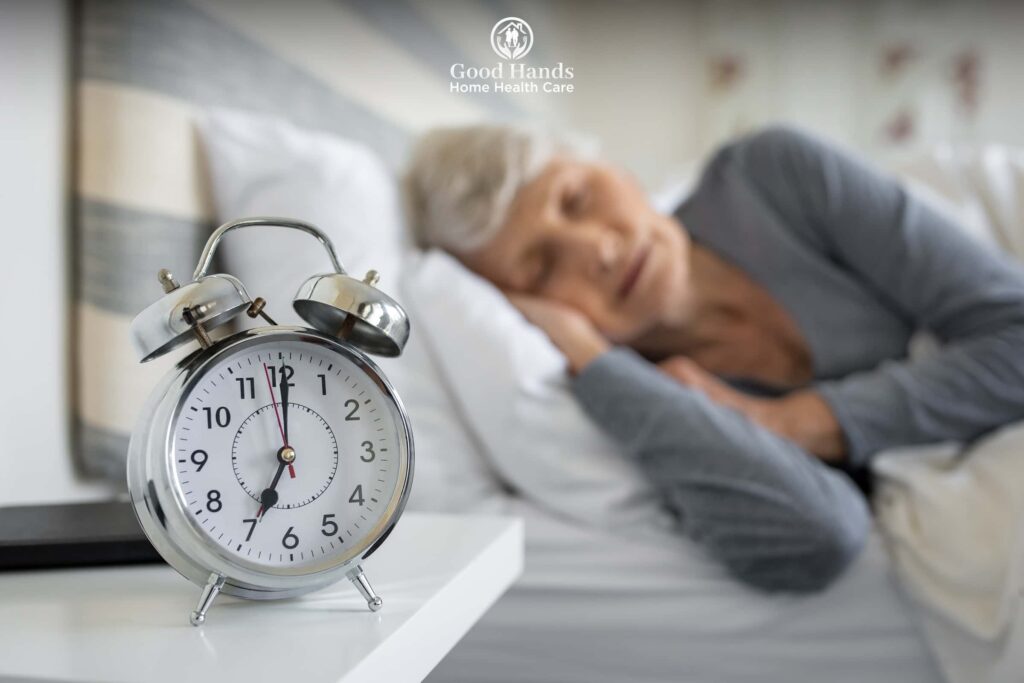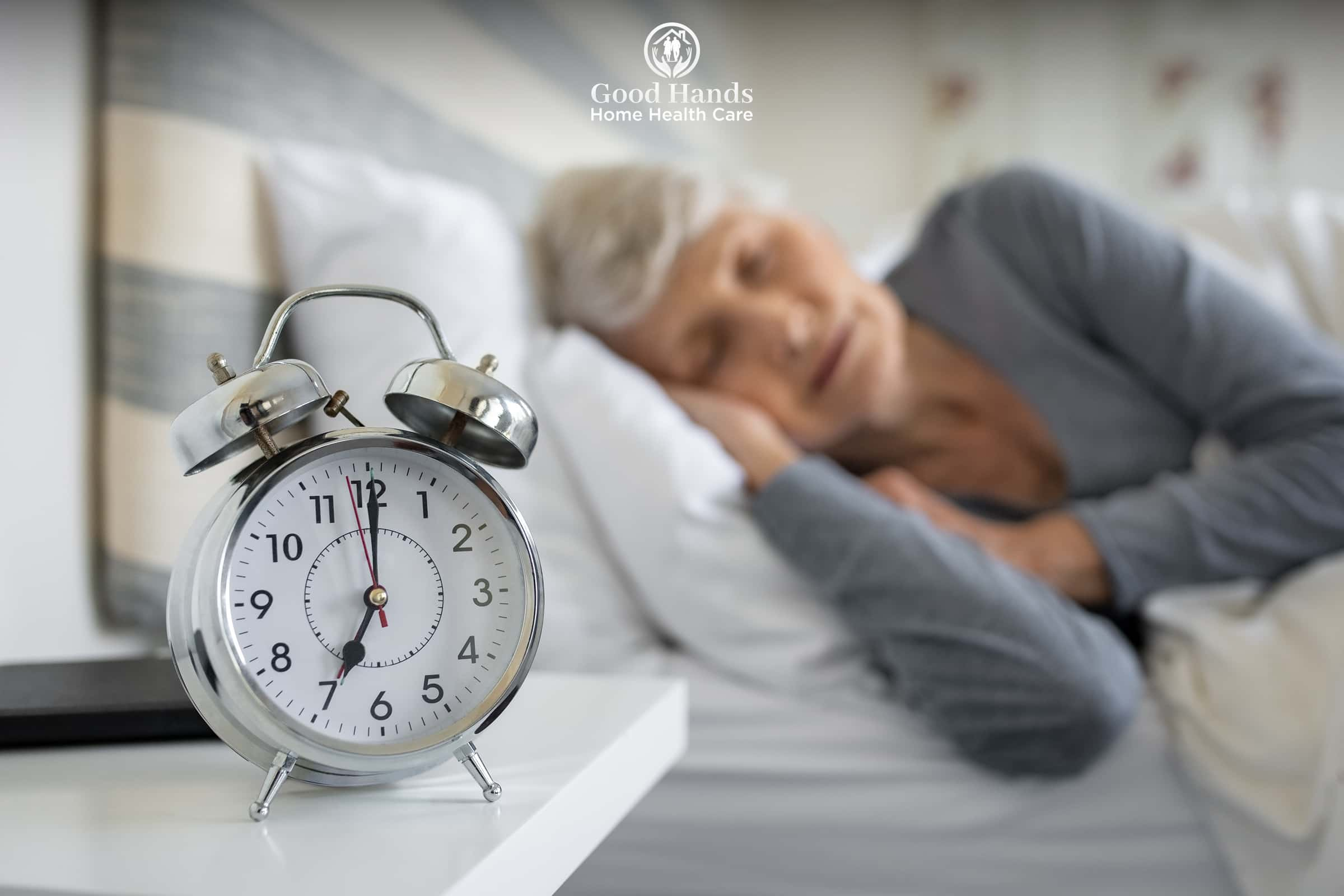Blog

Better Sleep After 60: Tips for a Restful Night

Better Sleep After 60: Tips for a Restful Night
Quality slumber becomes increasingly treasured as we journey through our golden years, yet countless seniors find consistent, refreshing rest elusive. At Good Hands Home Health Care, we recognize that peaceful nights directly influence your overall wellness and daily vitality. Explore these practical strategies that can naturally enhance your sleep quality and help you greet each morning feeling revitalized and energetic.
How Aging Affects Sleep
As we advance in our life journey, our relationship with slumber undergoes fundamental transformation. The profound, unbroken rest we once took for granted often becomes fragmented and less rejuvenating. Recognizing these natural transitions is essential when learning how to sleep better after 60.
The maturing body generates reduced melatonin and experiences shifts in circadian rhythms, directly impacting sleep architecture. Moreover, numerous seniors manage ongoing health conditions, medication effects, and hormonal fluctuations that further disrupt nighttime patterns. These aging and sleep quality connections explain why many experience lighter slumber, frequent midnight awakenings, and dawn rising with challenges returning to dreamland.
Daily Habits to Improve Sleep Naturally
Establishing thoughtful daytime practices creates the foundation for improved nights. Minor adjustments to your daily routine can dramatically enhance your body’s capacity to achieve deeper, more restorative slumber without prescription aids.
Lifestyle Adjustments for Better Rest:
- Welcome each day with 30 minutes of morning sunshine to calibrate your internal timekeeper.
- Participate in gentle physical movement like strolling, water exercises, or gentle yoga before 4 PM.
- Maintain hydration throughout daylight hours but minimize liquids two hours before bedtime.
- Restrict daytime rest periods to 30 minutes or less before 3 PM.
Sleep tips for seniors emphasize the significance of meal scheduling and content. Consider enjoying dinner at least three hours before retiring to allow proper digestion. Substitute afternoon caffeine with herbal infusions or water, as caffeine can remain active in your system for up to 12 hours. These straightforward modifications support enhanced nighttime rest by cooperating with your body’s natural processes rather than opposing them.
Creating a Calming Bedtime Routine
A reliable evening ritual signals your brain that it’s time to transition from wakefulness to slumber. This bedtime routine for seniors doesn’t require complexity—consistency matters far more than elaboration.
Elements of an Effective Wind-Down Sequence:
- Reserve 30-60 minutes before sleep for tranquil activities.
- Lower household illumination gradually to stimulate natural melatonin production.
- Step away from devices that emit sleep-disrupting blue light.
- Explore gentle stretching, mindfulness practices, or enjoying a physical book.
- Maintain bedroom temperature between 65-68°F for ideal conditions.
Enhancing nighttime rest frequently involves environmental modifications. Assess your sleep sanctuary—invest in a supportive mattress, install blackout drapes for darkness, and consider white noise to mask disruptive sounds. Good Hands Home Health Care professionals suggest creating a bedroom haven dedicated solely to rest, strengthening the mental association between your sleeping quarters and peaceful slumber.
Natural Sleep Aids and Remedies
When lifestyle adjustments prove insufficient, gentle natural sleep aids for seniors may help bridge the gap. Botanical supports like valerian root, chamomile infusions, and magnesium supplements have assisted many in finding relief from nighttime challenges. For elderly insomnia solutions, approaches such as guided visualization, progressive muscle relaxation, and rhythmic breathing exercises can quiet a busy mind before bedtime. Always consult your healthcare provider before starting any supplement regimen, as even natural remedies may interact with medications.
When to Seek Professional Help for Insomnia
Persistent rest difficulties warrant medical attention, particularly when they significantly impact your daytime functioning and life quality. If you regularly struggle to fall asleep, maintain sleep, or wake feeling unrested, it’s appropriate to discuss these concerns with a healthcare professional.
Certain symptoms deserve prompt medical evaluation, including loud snoring, gasping during rest periods, uncomfortable sensations in the legs at night, or extreme daytime drowsiness despite adequate time in bed. Many effective treatments begin with proper diagnosis of underlying conditions like sleep apnea, restless leg syndrome, or depression. Specialists offer valuable tools including cognitive behavioral therapy for insomnia (CBT-I), specialized assessments, and targeted interventions tailored to your specific requirements.
Final Tips for Restful Sleep After 60
Improving nighttime rest rarely happens overnight—patience and consistency yield optimal results. Monitor your patterns in a simple journal, noting factors that appear to enhance or diminish your rest quality. This record helps identify personalized approaches that work specifically for your body and circumstances.
Remember that better sleep after 60 requires harmonizing several health aspects. Physical comfort, emotional wellbeing, nutrition, and appropriate activity all influence your quality of rest. By observing which modifications help most, you’ll discover the right strategies for restorative nights. At Good Hands Home Health Care, we’re committed to helping older adults develop habits that boost both independence and quality of life.
Get Professional Sleep Support Today
Ready to transform your rest experience? Reach out to our specialists for personalized guidance tailored to your unique health needs. Our compassionate team can assist you in implementing effective strategies for achieving the restorative slumber you deserve.









